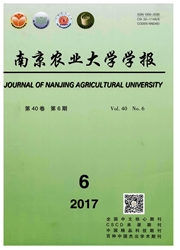

 中文摘要:
中文摘要:
为研究环境胁迫条件下热休克蛋白60mRNA(hsp。mRNA)转录水平和应激性损伤的关系,将3013龄AA肉鸡的饲养环境温度从(22±1)℃突然升高到(37±1)℃分别热应激1、2、3、5和10h后剖杀,利用临床血液病理学、组织病理学和荧光定量PCR方法,观察热应激不同时间对肉鸡重要器官心脏和肾脏组织损伤及其hsp60 mRNA表达水平的影响。结果显示,持续热应激处理后的肉鸡血液肌酸激酶(CK)和丙氨酸氨基转移酶(ALT)均显著升高,CK在2、3、5和10h与对照组(无热应激)差异极显著(P〈0.01),ALT在3h与对照组差异显著(P〈0.05),在5h和10h差异极显著(P〈0.01);持续热应激处理2h后的肉鸡心脏和肾脏组织均呈现出不同程度的以颗粒变性和水泡变性为主要特征的病理性损伤;心脏和肾脏组织中hsp60 mRNA转录水平在热应激2h时显著高于对照组(P〈0.05),而在5、10h逐渐恢复正常。提示:hsp60mRNA转录水平与其相应蛋白的表达和肉鸡组织的热应激损伤存在一定程度的关联性。
 英文摘要:
英文摘要:
Clinical blood parameter, histopathology, and fluorescence quantitative reverse transcription PCR (FQ-PCR) was used to study the heat shock damages and the expression of heat shock protein 60 mRNA ( hsp60 mRNA) in heat stressed broilers. Broil- ers were heat stressed forO h (as a control) and for 1, 2, 3, 5 and 10 h, by rapidly increasing the ambient temperature from (22±1)℃ to (37±1) ℃. The activity of creatine kinase (CK) was significantly increased by heat stress at 2 (P〈0.01 ) , 3 (P〈0.01 ) , 5 (P〈0. 01 ) and 10 h (P〈0.01) , respectively. The serum alamine aminotransferase (ALT) level remarkably in- creased at 3 (P〈O. 05 ), 5 ( P〈0. O1 ) and 10 h ( P〈0. 01 ). Meanwhile, at 2 h of heat stress, the parenchyma ceils enlarged by various degrees and aggregated the expanded intracellular spaces and the fine granular particles were seen in the myocardial fibers and epithelial cells of renal of all heat stressed chickens. By FQ-PCR, we observed that the expression of hsp60 mRNA significantly increased in the course of 2 h heat stress ( P〈0. 05 ), but did not remarkably change after 2 h. These results exhibited the correla- tion relationship between hsp60 mRNA expression and the tissues damage after acute heat stress.
 同期刊论文项目
同期刊论文项目
 同项目期刊论文
同项目期刊论文
 Localization of Heat Shock Proteins and Histopathological Changes in the Kidneys of Transported Pigs
Localization of Heat Shock Proteins and Histopathological Changes in the Kidneys of Transported Pigs 期刊信息
期刊信息
